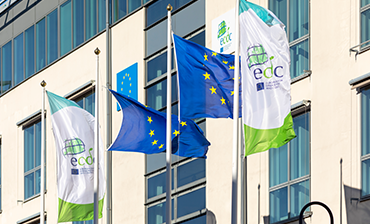
The purpose of this memorandum is to announce that ECDC does not intend to engage in proposals for this call led by external organisations as a formal bidding partner (i.e. beneficiary), but instead has an interest in collaborating or participating with successful consortia following selection and award of a grant by the European Commission. This decision was reached primarily in order for the Centre to maintain its policy of impartiality and transparency in engagement with consortia in competition for European Commission funded research.
ECDC considers that there are important opportunities for achieving synergies and efficiencies in the delivery of the goals of the H2020 call, in addition to strengthening EU surveillance of COVID-19 and vaccine effectiveness studies (as and when suitable candidate vaccines become available), through collaboration or participation of ECDC in the research to be delivered through the awarded contract. Such collaboration or participation would also ensure complementarity between work undertaken by ECDC as part of its mandated functions regarding COVID-19, and the work of the consortium/consortia successful in their bid, particularly with respect to data collection, laboratory external quality assurance, and coordination with national public health institutes, laboratories and primary care networks.
ECDC hereby summarises its considerations for collaborating with successful H2020 applicants, recognising that there are a range of options for the establishment of Pan-European COVID-19 cohorts.
The Centre’s specific areas of interest and expertise, and activities in which it can offer added value and complementarity through the work that it already undertakes with its existing networks and mandated tasks, for which collaboration is particularly welcomed, are:
- The use or strengthening of existing surveillance systems as a way to recruit COVID-19 patients for the activities foreseen in this action (ECDC currently coordinates EU level surveillance of COVID-19, including primary care surveillance and hospital-based surveillance in the EU/EEA and the UK, and supports Member States in performing sero-epidemiological studies applying standardised protocols).
- Establishing new fit-for-purpose surveillance systems as way to recruit COVID-19 patients for the activities foreseen in this action.
- ECDC is currently working on establishing population-based severe acute respiratory infection (SARI) surveillance systems, where reporting hospitals cover the entire population of a given administrative unit in a Country, for which the underlying population is known.
- ECDC is also interested to collaborate with partners that aim to include all primary care practices from the same areas covered by the hospitals, to perform sero-epidemiological investigations in the same areas in order to ensure that the whole COVID-19 disease spectrum is captured in the cohorts, and to acquire vaccination coverage data from the same population.
- The development of integrated data collections from different levels of care.
- The collection of accurate information on personal and external exposure to possible risk factors, including medicines and vaccines, in order to understand the impact of pharmaceutical and non-pharmaceutical interventions on COVID-19 occurrence.
- The estimation of vaccine effectiveness. Over the past 12 years ECDC has developed and validated methodologies and established networks of public health institutes (national and local) to independently monitor vaccine effectiveness and their impact for influenza and invasive pneumococcal disease. ECDC can therefore provide know-how, validated methods, and access to existing networks of study sites.
- ECDC is interested to collaborate with consortia that favour an approach that includes public health authorities and that is not discriminatory based on the countries’ quality of surveillance systems.
- Approaches to the use of new technologies, such as artificial intelligence and supercomputing. This may also imply using automatic data extraction from electronic medical records. ECDC is interested to collaborate with partners that consider performing validation studies on these data before drawing conclusions and public health recommendations.
- Laboratory-based sero-epidemiological studies, External Quality Assessments (EQAs) for diagnostic and serologic assays, virological surveillance, and analysis of the genome sequences.
ECDC welcomes dialogue with consortia on any or all of the above topics in the interests of achieving synergies, efficiencies, and coordination of activities.
This memorandum and listed considerations for collaboration will be posted publicly on ECDC’s website, and will be communicated to the European Commission.
Follow this news feed: EU





